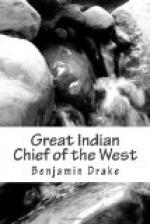In point of intellect, integrity of character, and the capacity for governing others, he is supposed to have no superior among the Indians: Bold, courageous, and skilful in war—mild, firm and politic in peace: He has great enterprize and active impulses, with a freshness and enthusiasm of feeling, which might readily lead him astray, but for his quick perception of human character, his uncommon prudence and his calm, sound judgment. At an early period of his life he became the chief warrior of his tribe, and by his superior talents, eloquence, and intelligence, really directed the civil affairs of his nation for many years, while they were nominally conducted in the name of the hereditary peace chief. Such is Keokuk, the Watchful Fox, who prides himself upon being the friend of the whiteman.
CHAPTER VI.
Murder of twenty-eight Menominies by the Foxes of Black Hawk’s band—Naopope’s visit to Malden—Black Hawk recrosses the Mississippi—General Atkison orders him to return—Stillman’s attack—Defeated by Black Hawk—His white flag fired upon—He sends out war parties upon the frontier—Attack upon Fort Buffalo—General Dodge’s battle on the Wisconsin—Black Hawk and his band leave the Four Lakes and fly to the Mississippi—Pursued by General Atkinson—Black Hawk’s flag of truce fired upon by the Captain of the Warrior—Twenty-three Indians killed.
Black Hawk and his band were not long upon the west side of the Mississippi, before new difficulties arose, calculated to disturb the harmony which it was hoped the treaty of the 30th of June, had established between them and the United States. The period of their removal to the west side of the Mississippi, was too late in the season to enable them to plant corn and beans a second time; and before autumn was over they were without provisions. Some of them, one night, recrossed the river to steal roasting-ears from their own fields,—to quote the language of Black Hawk,—and were shot at by the whites, who made loud complaints of this depredation. They, in turn, were highly exasperated at having been fired upon for attempting to carry off the corn which they had raised, and which they insisted, belonged to them.
Shortly after this, a party of Foxes, belonging, it is believed, to Black Hawk’s band, went up the Mississippi, to Prairie des Chiens, to avenge the murder of some of their tribe, which had been committed in the summer of 1830, by a party of the Menominies and Sioux. The Foxes attacked the camp of the Menominies and killed twenty-eight of them. The authorities at Prairie des Chiens, made a demand of the murderers, that they might be tried and punished under the laws of the United States, according to the treaty of 1825. Black Hawk, with other chiefs, took the ground that the United States had no right to make this demand, and refused to give them up. Here then was another source of difficulty.




